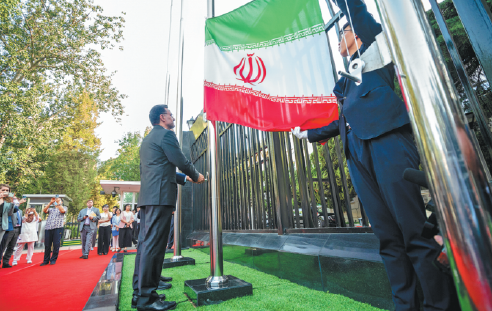Iran's entry affirms 'Look East' trend

Iran's integration into the Shanghai Cooperation Organization will open up new opportunities for its exchanges with the outside world and regional stability, analysts say.
Mehran Kamrava, professor of government at Georgetown University in Qatar, told China Daily that Iran's entry into the SCO is an important development in several respects. He said the membership was in line with Iran's "Look East "policy, wherein Teheran has focused on relations with non-Western states in the areas of diplomacy, commerce, and security cooperation.
Further, he said it also increases the possibilities for Iran to better interact and trade with countries that are willing to engage with it "in defiance of comprehensive, US-led sanctions".
Iran's full membership was approved at the 23rd meeting of the Council of Heads of State of the SCO held via video conference on Tuesday, ending an almost two-year process that began at the 21st SCO meeting in Dushanbe, Tajikistan, in 2021.
The SCO member states include China, India, Kazakhstan, Kyrgyzstan, Russia, Pakistan, Tajikistan, Uzbekistan, and now Iran.
Kamrava said that Iran "sees itself as an important catalyst in fostering a global arrangement that is an alternative to the so-called 'Washington consensus'. For Teheran, this alternative is anchored in the BRICS, especially in China and Russia, and now in the Shanghai Cooperation Organization".
BRICS, founded as BRIC in June 2009, is an acronym for the developing nations of Brazil, Russia, India, China, and South Africa — which officially became a member in 2011.
In his speech at the SCO virtual summit, Iranian President Ebrahim Raisi said his country believes the SCO "has a privileged position in promoting the development of political, security and economic cooperation".
Historic benefits
"Certainly, the benefits of the official membership of the Islamic Republic of Iran in the Shanghai Cooperation Organization will remain in history," he said.
Arhama Siddiqa, a Middle East analyst and research fellow at the Institute of Strategic Studies Islamabad in Pakistan, told China Daily that it is worth noting that in 2021, China and Iran signed a 25-year cooperation deal, specifically in areas such as oil, which officially brought Iran into the Belt and Road Initiative, or BRI.
She said this was "an important step in the overall regional development puzzle" and that "it was also interesting to see" the Chinese-brokered Iran-Saudi rapprochement earlier this year, which has helped Iran gradually emerge from diplomatic isolation.
Iran's integration into the SCO is significant as it demonstrates the organization's commitment to fostering collaboration among diverse nations and striving for a better future, Siddiqa said.
In his speech, Raisi said that while supporting constructive programs such as China's Global Development Initiative, he believes that the cooperation of SCO members in the fields of energy, technology, industry, agriculture, trade and commerce "can open a clear vision of a just regional order for the nations of the world".
Raisi blamed the US-led Western countries for jeopardizing the security and economic prosperity and the principles of fair trade in the world by "resorting to economic coercion and sanctions".
Kamrava said membership in the SCO further enables all member states to devise alternative means of trade and commerce that make the sanctions even less effective.
jan@chinadailyapac.com






















